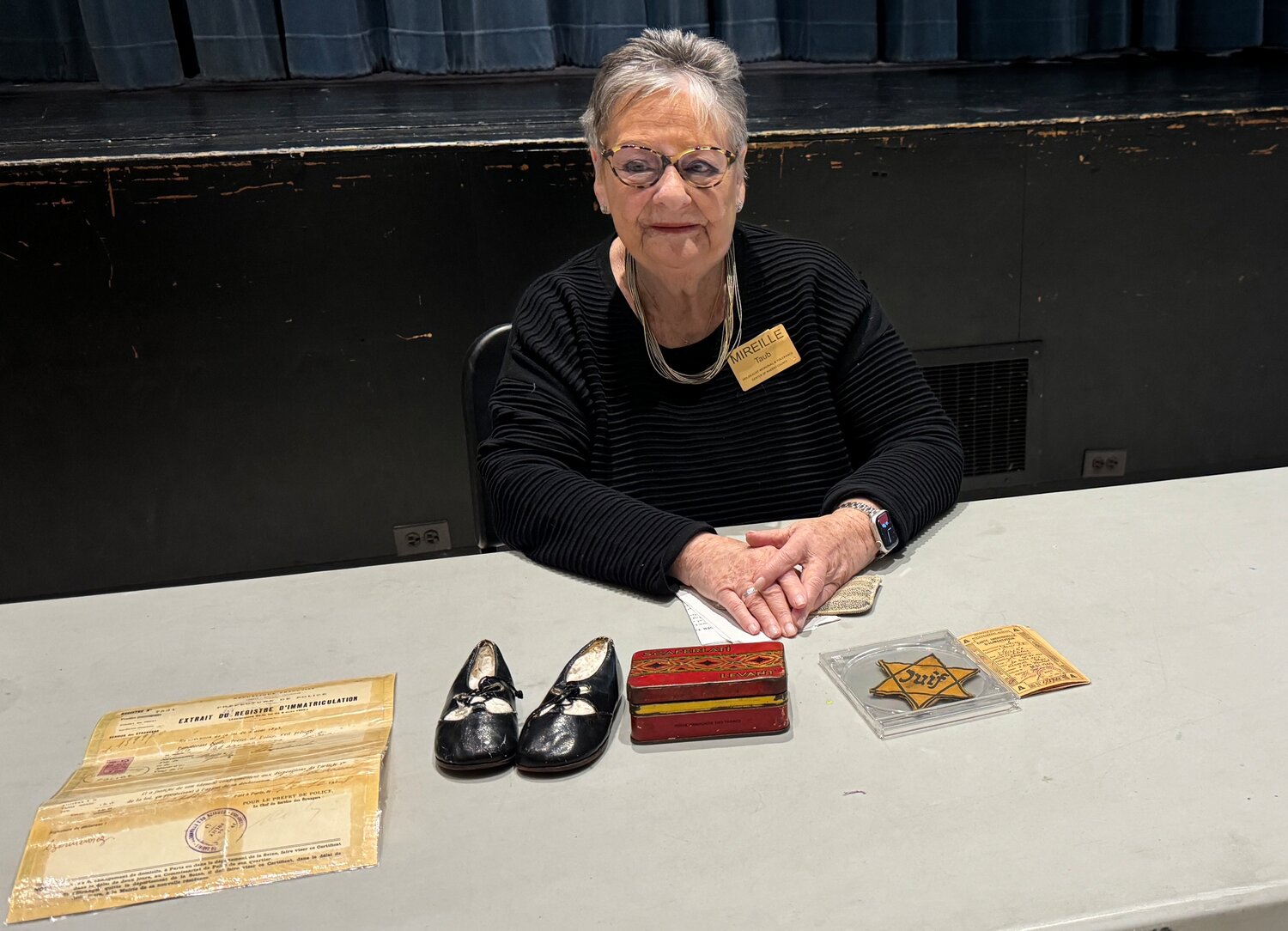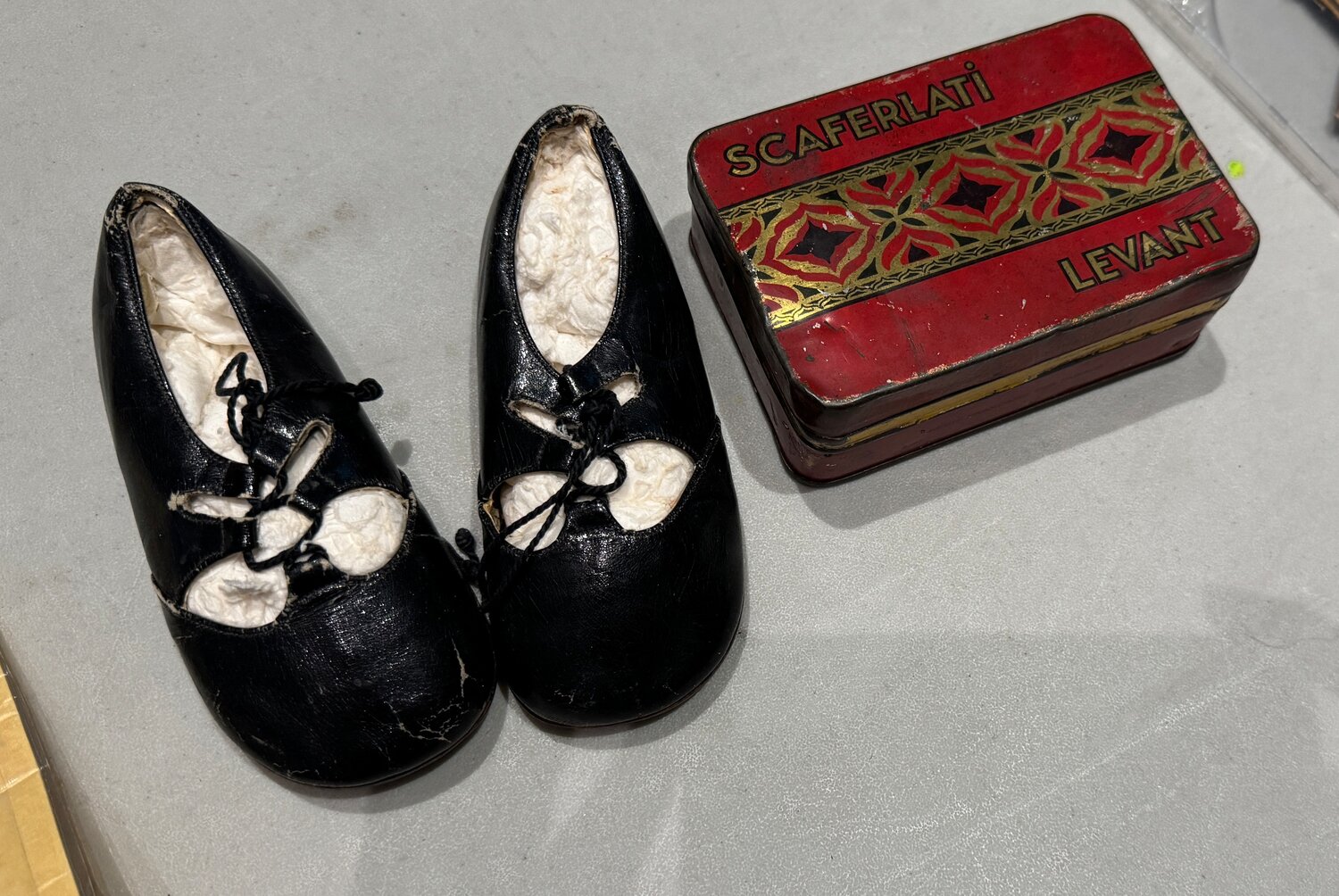Learning about escaping the Holocaust from a survivor
Mireille Taub, a Holocaust survivor and a Freeport resident since 1968, and Bernie Furshpan, a second-generation survivor, gave a presentation to students at Merrick’s Sanford H. Calhoun High School on Feb 27. The students’ reactions made it clear why stories like hers still hold so much significance today.
Christina Cone, the Bellmore-Merrick Central High School District’s social studies chair, introduced Taub to the students. Taub, who was born in Paris to Polish-Jewish parents, has called her story “the last train out of Paris.” Her family escaped from France before the country fell to Nazi Germany during World War II. They ended up in New York, arriving at Ellis Island.
Taub grew up in Brooklyn, and later became an educator, teaching in Freeport for 34 years and raising a family there. Now she is a volunteer at the Holocaust Memorial and Tolerance Center of Nassau County, in Glen Cove.
In the late 1930s, Taub was a child when tensions began rising in France, as Adolf Hitler rose to power with his Nazi regime in Germany. Paris — and the northern half of France — eventually fell to the Nazis, while the southern half remained free. Jews who lived in Paris were subject to harsh rules and regulations, and forced to wear a Star of David, she said.
Taub, who was too young to remember many of the details of her family’s escape, and learned most of the story from her parents, had relatives living in the United States. Her father arranged for them to get to America — but finding a way out of France, in a time of high political tension, was difficult.
At the time, the United States created quotas for immigrants, but as French residents, Taub’s family found it relatively easy to enter the country.
“The French quota was never filled,” Taub said, “because no one wanted to leave France.”
In the spring of 1940, she and her family took what her father called “the last train out of Paris,” as France was preparing to surrender to Germany. They trekked toward Bordeaux, a city on the Atlantic, and from there crossed the Pyrenees mountains, which separate France from Spain, in a truck driven by an American consulate employee who, ironically, had issued Taub’s father his papers to leave France.
From Spain they traveled toLisbon, Portugal, where they boarded a ship to the U.S. Taub and her family arrived in New York in August 1940.
“As a little girl growing up in the war, I knew what was going on,” she recalled. “My bedroom was off the kitchen, and family who gathered would talk in several different languages. I understood the English, I understood the French — I did not understand the Polish. My parents would tell me as much as a child could understand.”
Her late husband, David Taub, was shuffled around France as a young boy, and survived the war thanks to the “kindness of strangers” helping him his parents and his older brother, Mireille said.
David lived as a “hidden child,” with family in the free part of France protecting his identity. But he also traveled with his mother to Beaune-la-Rolande, an internment and transit camp for Jews in occupied France, to rescue his brother, who was imprisoned there. Conditions there, like many Nazi-run camps, were insufferable.
Her husband has since died, but Taub has made it part of her life’s work to tell their stories and educate people about the Holocaust. While she and her family managed to escape and survive, many of her relatives in Europe were not as lucky, and were imprisoned or killed.
Throughout Taub’s presentation, she showed photos and mementos from her past, including the shoes she wore while fleeing France, her mother’s sewing kit — which was kept in an old tobacco carton — and the Star of David that her husband was forced to wear in occupied France.
“We were the lucky ones — I survived in America,” she said. “My husband survived unspeakable conditions, and often spoke about them. I am always moved by these stories, because they are part of who I am.”
Learning about hate and prejudice is important in the Bellmore-Merrick school district, officials said. Student leaders in the high schools have opportunities to lead lessons in the middle schools, and educate younger peers about hate symbols and hate speech.
“It’s even deeper than that,” Cone told the Herald. “It’s been a passion of mine — and I’m sure many other educators — to ensure that the lessons of the past don’t get forgotten.”
Cone said it is interesting that Taub describes her late husband’s story as “the kindness of strangers,” and added that she hoped it resonated with students.
“We all have it in us to do the right thing,” she said.

 66.0°,
Shallow Fog
66.0°,
Shallow Fog 







